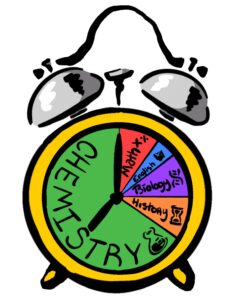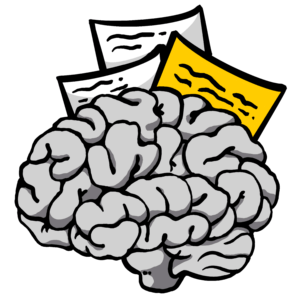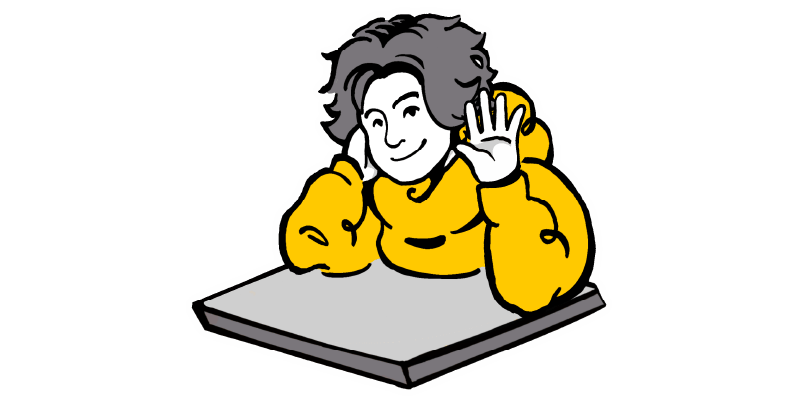Meet Dan.
Dan needs to take a big exam, but he doesn’t study for it much. He might glance at a chapter or two of his textbook and create a few flashcards, but he’s concerned with other, more enjoyable, activities.
When test day comes around, Dan is shocked that his score is well below what he needs. He’ll have to quit or try again.
Nobody wants to be Dan.
But Dan has a friend you might not know about. He’s equally as common as Dan, but few people realize they’re emulating him.
Meet Steve.

Steve also has a big exam coming up, but unlike Dan, he’s going to study hard. He reads every chapter of his study guide, flips through 300 flashcards a day, and even takes a practice test.
Steve is going to crush his exam!
Except he doesn’t.
Test day comes around, and he finds himself in the same situation as Dan. He’s failed, and he’ll have to try again.
How could they end up in the same boat?
What did Steve miss?
He didn’t take practice tests in an organized way.
Here’s how you can avoid ending up like Steve.
Practice Makes Perfect
It’s cliché because it’s true. You can’t rely on reading alone to prepare you for test day.
Your mind is notoriously bad at understanding how much you know about something. When you read, your brain can trick you into thinking you know everything about a subject, when in reality, you would fail to recall any of it on test day.
Just because you can recognize what mitochondria are doesn’t mean you can explain how they work well enough to answer questions about them.
So reading alone doesn’t work, but didn’t Steve take a practice test?
Yes, but he didn’t put much thought into it.
He took the test, glanced at his score, then went back to other things.
Taking a practice test alone won’t get you a great score on your exam. You have to take several practice tests in a few specific ways and learn from how they went.
That’s not very clear, so let’s get into the step-by-step process.
6 Ways to Maximize Your Practice Tests
Take A Pretest
Before you start studying at all, you need a game plan.
What are your biggest weaknesses?
How well do you understand the structure of the test?
To answer these questions, you should take a practice test before you dive into studying. Go through the test just like you will on test day, then review the test to see where you need the most work.
Doing this will also give you a baseline for how you’re improving. Getting 62% on a practice test might feel demotivating unless you scored 51% on your first practice test. Then it’s a huge improvement!
Review Every Answer
Regardless of if you got a question right or wrong, you need to look at every question to ensure you understand why you answered the way you did.
Did you guess?
Did you understand how the question was worded?
Was it easy? Was it hard?
By analyzing your performance, you’re setting yourself up for a deeper understanding and better results in future practice tests. Remember, it’s not just about getting the correct answer. You need to truly grasp the reasoning behind it.
For the questions you got right, ensure your approach was sound. For those you missed, delve into the reasons why. By identifying how many you got wrong in each category, you’ll gain insights that will guide your next steps in preparation.
Allocate Time Based on Your Weaknesses

By looking through every question and answer of your last practice test, you should get a good idea of which areas of the test you’re struggling with.
With that info, you can allocate your study time based on your weakest subjects.
For many tests, it’s impossible to study every topic evenly. There’s too much to cover, and you might even be wasting time if you focus on subjects you know by heart.
If you nailed the science section but struggled with math, you should spend a lot more time reviewing math concepts.
Depending on how far away your test is, you should probably still spend time reviewing your strongest subjects. But you don’t have to do it for long. Reviewing them should take a much shorter time than the subjects you have to wrestle with.
Simulate the Real Exam Experience

Just like athletes have scrimmages and actors have dress rehearsals, you need to take at least one test that feels exactly like the real thing. That means accurately recreating the time limit, environment, restrictions, etc.
If you take every practice test while listening to music and checking your phone every 20 minutes, your brain will look for those things on test day.
But won’t be able to get them.
So, if your test is in your library’s testing center at 8 AM on Saturday with a time limit of two hours and a strict no-phone policy, you should take a practice test at 8 AM on a Saturday in your library’s testing center without your phone in under two hours.
This will train your brain to answer questions in the correct environment and show you that taking the test is possible with those restrictions.
Take It Slow
Okay, let’s contradict that last point.
You don’t need to take every practice test in the exact same way as the real exam. In fact, it can be helpful to take some practice tests slowly with your book open.
To see why this might be a good idea, imagine you’re taking a test, and you come across four straight questions about exponents.
In this scenario, you aren’t exactly sure what exponents are and don’t know enough to answer the first question. You decide to guess and move on to question #2. You haven’t learned anything new about exponents, so you have to guess on this question as well.
And question #3.
And question #4.
You answered four questions on exponents, but since you didn’t know much about the topic, you had to guess on each one.
Now imagine you stopped after guessing on the first question, opened your book, and read up on exponents. After that, you read the answer explanation for the first question, then continued the test.
Here, you identified a topic you didn’t know about, immediately went and tried to understand it, then used what you had learned and experienced to inform your answers for the next set of questions.
This can be much more helpful than fumbling through a test when you clearly need to improve your understanding.
Mix It Up
Don’t test yourself on the same set of questions each time. If you do that, you’ll start to learn the answers to those questions instead of really understanding the topics they’re asking about.
To really test yourself, you need to switch up your questions frequently.
For example, if your study book has three practice tests, you should rotate through the set instead of taking the first practice test three straight times.
It’s okay to take the same test multiple times, but you should give yourself a significant amount of time in between.
If you combine all (or even a few) of these practice test strategies with reviewing a study guide and flashcards, you won’t have to worry about failing your test like Dan or Steve.
You’ll be prepared for every question that comes your way, and you’ll know exactly what to expect when you walk into your test.
It’s not just about the quantity of your preparation but the quality and intention behind each practice session.
Happy studying!

